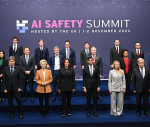You are here
The soft power showdown: US vs China
Oct 02,2023 - Last updated at Oct 29,2023
In the complex arena of international relations, where diplomacy, culture and values take centre stage, the concept of soft power shines as a defining force. Soft power represents the ability of a nation to coopt, rather than coerce, others into embracing its preferences. It relies on attractive ideas and a compelling appeal rather than forceful tactics. At the heart of this power are cultural, political and diplomatic assets, as well as media, education and communication. As Joseph Nye, the proponent of this concept, aptly puts it, "The best propaganda is not propaganda.”
The rise of soft power has revolutionised the traditional understanding of global influence, challenging the conventional notions of military and economic might as the sole determinants of a nation's power. Understanding soft power dynamics reveals a complex web of cultural and ideological appeal, political values and diplomatic prowess. This perspective unveils the vivid contrast between the United States and China, two global giants whose strategies in wielding soft power differ dramatically.
US soft power supremacy
Several factors render the United States exceptionally attractive on the global stage, underscoring the pivotal role of soft power in shaping contemporary international dynamics. Since World War II, the US has demonstrated its soft power capabilities, reflecting the evolving power paradigms. Although anti-American sentiments have surged in recent decades, especially in the developing world, the US projection of power goes far beyond military might.
At the societal level, American values of freedom, gender equality and social progress have stood out as a beacon of attraction. Politically, democracy, a hallmark of American society, remains one of humanity's most cherished achievements. In economic terms, the success of capitalism and the American dream continue to captivate imaginations worldwide. The US commitment to religious freedom, global diplomacy and its role in combating global challenges, such as terrorism, climate change and poverty alleviation further enhance its soft power influence.
Moreover, American media and communication networks hold unparalleled sway. American brands like Coca-Cola and McDonald's have achieved international recognition. Lastly, the US commitment to human rights and the flourishing of democracy serve as key elements of its soft power strategy.
China's ascent and challenges in soft power
In contrast, China's approach to soft power presents a different narrative. While China recognises the importance of soft power, especially in the changing global landscape, it faces unique challenges. Western culture, dominated by American spectacles like Hollywood, enjoys global primacy. American brands have become household names around the world.
The US emphasis on higher education as a cornerstone of soft power is unrivalled. Chinese institutions have yet to match American universities in terms of global recognition and influence. Although China attracts students from developing nations with free higher education, it is still lagging behind the US, which has a better comprehensive academic infrastructure.
Furthermore, China's state-controlled media landscape and stringent censorship limit its international reach. The world is well-acquainted with global news outlets like CNN and BBC, while Chinese media struggle to gain recognition beyond its borders.
The future of soft power
In a changing world, soft power takes on even greater significance. Analysts speculate that future conflicts may centre on the battle for soft power supremacy. China's efforts during the COVID-19 pandemic, providing aid and vaccines to developing nations, demonstrate its recognition of soft power's importance.
In conclusion, the value of soft power cannot be underestimated. It has reshaped the dynamics of global influence, with cultural, ideological, and political appeal taking precedence over brute force. In the showdown between the US and China, it is evident that the US holds a distinct and superior position in terms of soft power projection. While China strives to enhance its soft power capabilities, the US enduring appeal remains a testament to the enduring power of ideas and values on the world stage.
- Popular
- Rated
- Commented
Nov 03, 2023
Nov 03, 2023
Oct 31, 2023
Nov 03, 2023
Newsletter
Get top stories and blog posts emailed to you each day.











